
The Way of the Exploding Fist is a 1985 fighting game based on Japanese martial arts developed by Beam Software, by a team consisting of Gregg Barnett, Bruce Bayley, Neil Brennan and David Johnston. Originally developed on the Commodore 64 and published in June 1985 by Melbourne House, ports were made for Amstrad CPC, ZX Spectrum, BBC Micro, Acorn Electron and Commodore 16.

Artic Computing was a software development company based in Brandesburton, England from 1980 to 1986. The company's first games were for the Sinclair ZX81 home computer, but they expanded and were also responsible for various ZX Spectrum, Commodore 64, BBC Micro, Acorn Electron and Amstrad CPC computer games. The company was set up by Richard Turner and Chris Thornton. Charles Cecil, who later founded Revolution Software, joined the company shortly after it was founded, writing Adventures B through D. Developer Jon Ritman produced a number of ZX81 and Spectrum games for Artic before moving to Ocean Software.

Tornado Low Level is a multidirectional flight game developed by Costa Panayi and published in 1984 by the company he co-founded, Vortex Software. The game was released for the ZX Spectrum in 1984, with ports for the Amstrad CPC and Commodore 64 in 1985.

Knightmare is a computer game released by Activision in 1987 for various 8 and 16-bit computer formats, including ZX Spectrum, Amstrad CPC, Commodore 64 and Atari ST. It was written by Mev Dinc, J.P. Dean, E.M. Dean and Nick Cooke, and is based on the Anglia Television show Knightmare.
Crystal Computing, later renamed Design Design, was a British video game developer founded in 1982 by Chris Clarke and Ian Stamp while students at the University of Manchester. Graham Stafford, Neil Mottershead, Simon Brattel and Martin Horsley, joined the company as it expanded. The company's first software release was a compilation of games for the Sinclair ZX81, though it was with the ZX Spectrum that Crystal found its greatest success. A deal with the machine's manufacturer Sinclair to distribute Crystal's Zeus Assembler gave the company sufficient funds for a major marketing campaign for their next product, Halls of the Things, an arcade adventure game that became their most successful title.
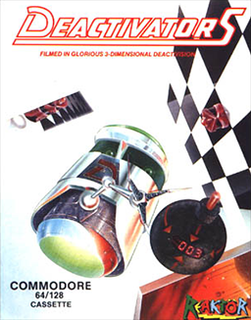
Deactivators is a 1986 puzzle video game designed by David Bishop and Chris Palmer, developed by Tigress Marketing and System Software, and published by Ariolasoft's action game imprint Reaktor. The player controls bomb disposal robots known as deactivators and must use them to deactivate bombs planted by terrorists in five research complexes. The concept for the game came from a brainstorming session between Bishop and Palmer; its design and development took five to six months to complete. It was released for the Amstrad CPC 464, Commodore 64, and ZX Spectrum platforms in October 1986.
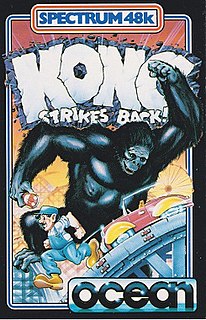
Kong Strikes Back! is a 1984 platform video game published by Ocean Software in 1984 for the Amstrad CPC, Commodore 64 and ZX Spectrum. While its predecessor, Kong, is a Donkey Kong clone, Kong Strikes Back! is a clone of Mr. Do's Wild Ride with Donkey Kong-inspired graphics.

10th Frame is a ten-pin bowling simulation game published by Access Software in 1986. Up to eight players can take part in open bowling or a tournament. It was released for the Amstrad CPC, Atari ST, Commodore 64, IBM PC compatibles, MSX, and ZX Spectrum.
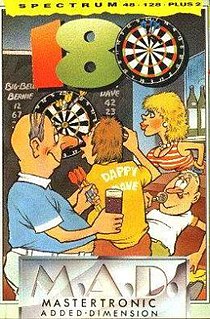
180 is a darts video game released for the ZX Spectrum, Commodore 64, Amstrad CPC, Atari 8-bit family in 1986 and MSX in 1987.

Enduro Racer (エンデューロレーサー) is an arcade racing game from Sega. It was released in 1986 with two arcade cabinet versions, a stand-up cabinet with handlebars and a full-sized dirt bike cabinet. It is often seen as a dirt racing version of Hang-On, as it uses a similar engine and PCB. The game was later released for the Master System in 1987, the ZX Spectrum and Commodore 64 in 1988, and the Amstrad CPC and Atari ST in 1989.

Zub is a 1986 platform video game designed by Ste and John Pickford, developed by Binary Design, and published by Mastertronic for the Amstrad CPC, Commodore 64 and ZX Spectrum. The game has the player control Zub, who has to travel to different planets to retrieve the Green Eyeball of Zub. A parody of the game Light Force, called Lightfarce, was added in as an easter egg. The music on all computers was composed by David Whittaker.

Highlander is a video game tie-in to the Highlander franchise released in 1986, the same year as the film, published by Ocean Software for the ZX Spectrum, Commodore 64 and Amstrad CPC home computers. Highlander was panned by reviewers.
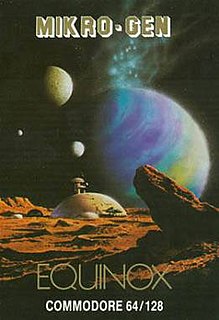
Equinox is an action video game released by Mikro-Gen in 1986 for the ZX Spectrum, Amstrad CPC, and Commodore 64.

Bugsy, also known as The King of Chicago, is a 1986 graphic adventure game for the Commodore 64, Amstrad CPC, and ZX Spectrum developed by St. Bride's School and published by CRL Group exclusively in Europe. Its protagonist, Bugsy Maroon, is a rabbit gangster in 1922 Chicago. The objective of the game is to be a successful criminal. While primarily text-based, it features simple graphics depicting the current scene.

Batman is a 1986 3D isometric action-adventure game by Ocean Software for the Amstrad PCW, Amstrad CPC, ZX Spectrum, and MSX, and the first Batman game developed. The game received favourable reviews. An unrelated Batman game was released two years later, titled Batman: The Caped Crusader.

Heartland is a platform game for the ZX Spectrum, Amstrad CPC, and Commodore 64 released by Odin Computer Graphics in 1986.

BMX Simulator is a racing video game designed by Richard Darling and released by Codemasters in 1986 for the Commodore 64. It is part of a series of games that includes ATV Simulator, Grand Prix Simulator, Professional Ski Simulator, and a sequel: Professional BMX Simulator. BMX Simulator was ported to the Amiga, Atari 8-bit family, Atari ST, Amstrad CPC, MSX, and ZX Spectrum.
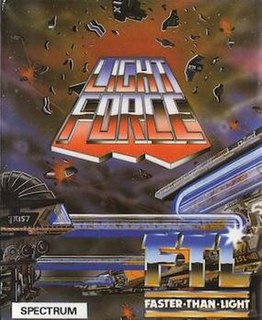
Light Force is a 1986 vertically scrolling shooter designed by Greg Follis and Roy Carter, developed by their company Gargoyle Games, and published under their Faster Than Light imprint. It was released for the Amstrad CPC, Commodore 64, and ZX Spectrum platforms.

Top Gun is a 1986 combat flight simulation game based on the film of the same name. It was developed and published by British company Ocean Software, and was released for several computer platforms. In the United Kingdom, it was released for Amstrad CPC, Commodore 64, and ZX Spectrum in December 1986. The following year, it was released for Atari ST. In the United States, it was published by Thunder Mountain. In 1989, it was published by The Hit Squad as a budget re-release for ZX Spectrum and Commodore 64.

Yes, Prime Minister is a 1987 adventure game based on the television series of the same name. It was developed by Oxford Digital Enterprises and published by Mosaic Publishing. It was released in Europe for Amstrad CPC, BBC Micro, Commodore 64, DOS, and ZX Spectrum. Critics found it a faithful adaptation of the television series, but remarked on its high price, short length, and lack of long-term appeal.



















